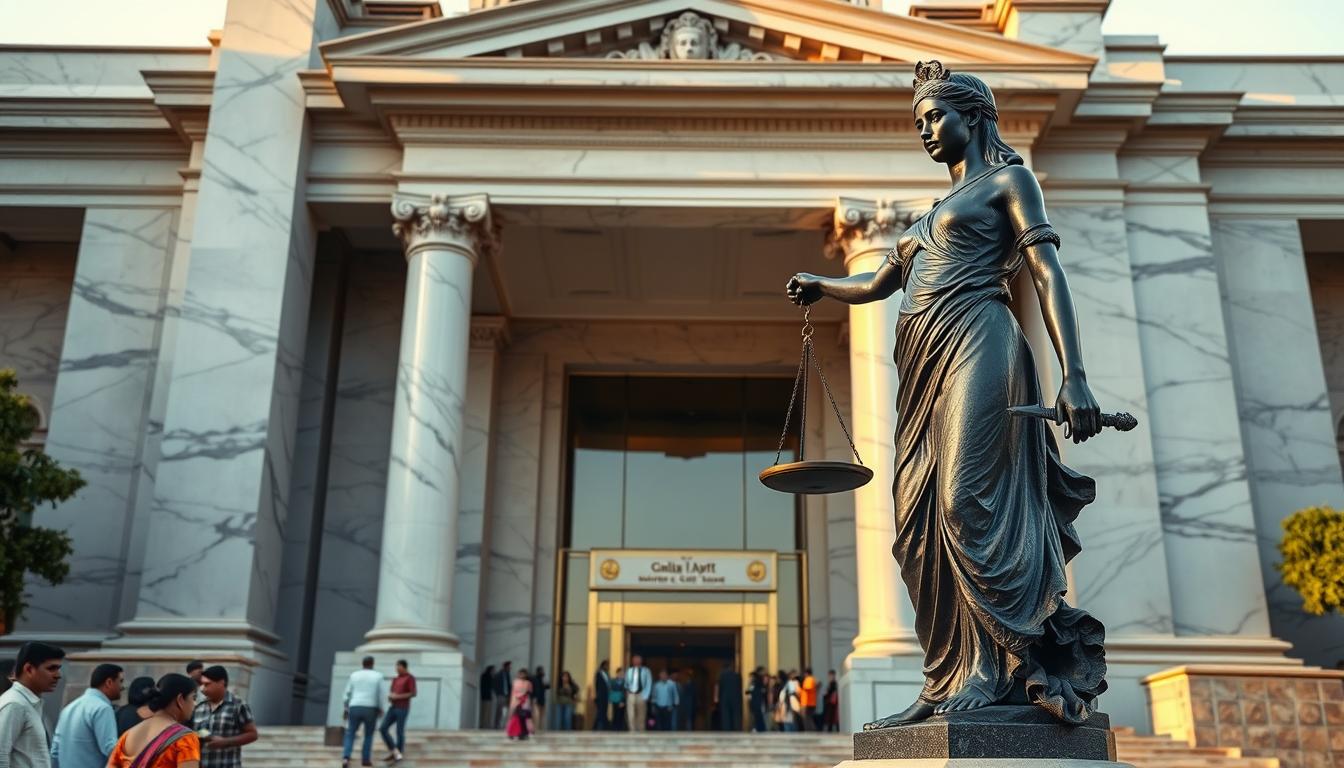Did you know that millions of citizens in India are unaware of their basic rights under the Indian legal system? This lack of awareness can lead to exploitation and injustice, emphasizing the need for citizens to understand their legal rights.
Understanding your rights is crucial in navigating the complexities of the law. It empowers you to make informed decisions and seek justice when needed. This article aims to provide a comprehensive overview of the basics every citizen should know about their rights and the Indian legal framework.
By knowing your rights, you can better protect yourself and your community. Stay informed, and let’s explore the essentials of the Indian legal system, together.
Understanding the Indian Legal System
The Indian legal system is a cornerstone of democracy, offering legal protections and upholding constitutional rights in India. It is designed to ensure justice and equality for all citizens.
Structure of Courts and Jurisdiction
The Indian legal system is hierarchical, with a clear division of powers among its courts.
Supreme Court and High Courts
The Supreme Court, is the highest judicial authority, interpreting the Constitution and ensuring its provisions are upheld. High Courts have significant jurisdiction over the states they serve, handling a wide range of cases.
District and Lower Courts
District and Lower Courts deal with civil and criminal cases at the grassroots level, providing access to justice for ordinary citizens.
Key Legal Codes and Statutes
The Indian legal framework is based on key legal codes and statutes, such as the Indian Penal Code and the Code of Civil Procedure. These laws form the foundation of legal protections in India, guiding the application of justice.
Fundamental Legal Rights in India
The Indian Constitution enshrines a set of fundamental rights that are pivotal in ensuring the dignity and equality of its citizens. These rights are not only essential for the well-being of individuals but also form the foundation of a just and equitable society.
Constitutional Fundamental Rights
The Constitution of India guarantees certain fundamental rights to its citizens, which include:
- Right to Equality: Ensuring equal treatment before the law and equal opportunities.
- Right to Freedom: Protecting citizens’ freedoms of speech, expression, and assembly.
- Right Against Exploitation: Prohibiting human trafficking and forced labor.
Civil and Political Rights
Beyond constitutional fundamental rights, citizens enjoy civil and political rights that are vital for a functioning democracy.
- Voting Rights: The right to participate in the democratic process by voting.
- Property Rights: The right to own property.

How to Exercise Your Legal Rights
Knowing your legal rights is the first step; exercising them effectively is equally important. In India, citizens have various legal remedies available to them, and understanding these processes can empower individuals to seek justice.
Legal Remedies and Procedures
The Indian legal system offers several legal remedies, including filing police complaints and pursuing public interest litigation. Filing a police complaint, is the initial step in seeking legal redress for many grievances. It is essential to provide detailed information and evidence when filing a complaint to facilitate a thorough investigation.
Filing Police Complaints
To file a police complaint, one should visit the nearest police station and provide a written statement detailing the incident. It’s advisable to keep a copy of the complaint for future reference.
Public Interest Litigation
Public Interest Litigation (PIL) is a powerful tool that allows citizens to approach the courts on matters affecting public interest. PILs can be filed on issues such as environmental degradation, corruption, or human rights violations.
Accessing Legal Aid and Resources
Accessing legal aid is crucial for those who cannot afford legal representation. India has various resources available to provide legal assistance.
Government Legal Services
The Indian government offers legal services through various programs and institutions. These services aim to provide free or subsidized legal aid to eligible citizens.
NGOs and Advocacy Groups
Several NGOs and advocacy groups work tirelessly to provide legal assistance and support to marginalized communities. These organizations often specialize in specific areas of law, such as human rights or environmental law.
| Legal Remedy | Description | Eligibility |
|---|---|---|
| Filing Police Complaints | Initial step for seeking legal redress | Any citizen with a grievance |
| Public Interest Litigation | Legal action on public interest matters | Citizens or organizations affected by public interest issues |
| Government Legal Services | Free or subsidized legal aid | Economic status-based eligibility |
| NGOs and Advocacy Groups | Specialized legal assistance | Varies by organization; often for marginalized communities |
Empowering Citizens through Legal Awareness
Understanding the legal framework in India is crucial for citizens to navigate the complexities of the law and ensure justice. The Indian legal system, with its structured courts and jurisdiction, provides a foundation for protecting citizens’ rights.
By being aware of their fundamental legal rights and how to exercise them, citizens can better protect their interests and contribute to a just society. The legal framework in India is designed to empower its citizens, and leveraging it effectively is key to achieving this goal.
Citizens who are informed about the legal remedies and procedures available to them can seek justice more effectively. Access to legal aid and resources further enhances their ability to navigate the legal system.
In essence, knowledge of the legal framework in India is a powerful tool for citizens. By understanding and exercising their legal rights, citizens can play a more active role in shaping a just and equitable society.
FAQ
What are my fundamental rights under the Indian Constitution?
The Indian Constitution guarantees certain fundamental rights, including the right to equality, freedom, and protection against exploitation. These rights are enshrined in Part III of the Constitution and are essential for ensuring that citizens are treated fairly and justly.
How do I file a police complaint in India?
To file a police complaint in India, you can visit the nearest police station and provide a detailed account of the incident. You can also file a complaint online through the official website of the police department or through the e-FIR portal. It is essential to provide as much information as possible, including dates, times, and details of the incident.
What is Public Interest Litigation (PIL) and how can I file one?
Public Interest Litigation (PIL) is a legal remedy that allows citizens to approach the courts on matters of public interest. To file a PIL, you can petition the High Court or the Supreme Court, highlighting the issue and seeking relief. It is recommended to consult a lawyer to guide you through the process.
Where can I access free legal aid in India?
You can access free legal aid in India through government legal services, such as the National Legal Services Authority (NLSA) and State Legal Services Authority (SLSA). Additionally, many NGOs and advocacy groups provide legal assistance to those in need.
What are my rights as a voter in India?
As a voter in India, you have the right to cast your vote freely and secretly. You are also entitled to register your vote, verify your voter ID, and participate in the electoral process. It is essential to exercise your voting rights to contribute to the democratic process.
How can I protect my property rights in India?
To protect your property rights in India, you should ensure that you have a clear title to the property, register your property documents, and be aware of any potential disputes or issues. You can also seek legal assistance from a lawyer or a property expert to guide you through the process.

